

Successful TOEFL Test - Food. 1.

How have the eating habits of people changed since the invention of a microwave oven and the spread of prepared food? Do you consider the tendency in modern food production a positive thing? Why or why not. Support your answer with concrete examples and reasons. 2. 3. 4. 5. 6. The Inefficiency of Local Food. Two members of Congress earlier this month introduced legislation advancing a food reform movement promising to help resolve the great environmental and nutritional problems of the early 21st century.
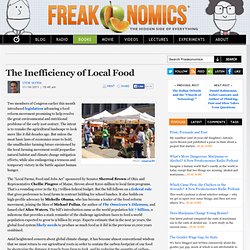
The intent is to remake the agricultural landscape to look more like it did decades ago. But unless the most basic laws of economics cease to hold, the smallholder farming future envisioned by the local farming movement could jeopardize natural habitat and climate change mitigation efforts, while also endangering a tenuous and temporary victory in the battle against human hunger. The “Local Farms, Food and Jobs Act” sponsored by Senator Sherrod Brown of Ohio and Representative Chellie Pingree of Maine, throws about $200 million to local farm programs. The French Paradox. For much of the past decade, American and British scientists have been annoyed by the phenomenon known as the French Paradox.

Nutritionally speaking, the French have been getting away with murder: They eat all the butter, cream, foie gras, pastry and cheese that their hearts desire, and yet their rates of obesity and heart disease are much lower than ours. The French eat three times as much saturated animal fat as Americans do, and only a third as many die of heart attacks. It’s maddening. Baffled, scientists struggled to come up with a few hypotheses: Maybe it was something in the red wine, they said. But while winemakers worldwide celebrated that news, more sober research has suggested that any alcohol — whether Lafite Rothschild, a banana daiquiri or a cold Bud — pretty much has the same nice, relaxing effect. After the wine argument, scientists ventured that it must be the olive oil that keeps the French healthy.
Round-Up of Food Memoirs and Essays. Round-Up of New Food Memoirs and Collections of Essays [Round-up of New Baking Books][Round-up of New Ethnic/International Books][Round-up of New Food Issues Books][Round-up of New Diet/Nutrition Books][Round-up of Chef's/U.S.
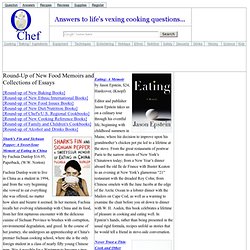
Regional Cookbooks][Round-up of New Cooking Reference Books][Round-up of Family and Children's Cookbooks][Round-up of Alcohol and Drinks Books] Shark's Fin and Sichuan Pepper: A Sweet-Sour Memoir of Eating in Chinaby Fuchsia Dunlop $16.95, Paperback, (W.W. Norton) Fuchsia Dunlop went to live in China as a student in 1994, and from the very beginning she vowed to eat everything she was offered, no matter how alien and bizarre it seemed. Eat, Memory: Line of Sight. Food - Eat, Memory - Pot Luck - Food - Eat, Memory. Eat, Memory: I Scream. Eat, Memory: Orange Crush. Bunnell1bfoodie. No Time Between Fast and Healthy One ALTERNATIVE?

SUBSCRIBE TO A CSA BOX (COMMUNITY SUPPORTED AGRICULTURE). This IS A BOX WITH FRUITS AND My sister receives a CSA box every week. Her own blog about recipes with local foods and eating healthy that is quite inspiring. Still is one of the most healthiest eaters I know of. What is another healthy alternative? A person is rushing in the morning to get to work (or wherever they are needed to be) and needs something quick to eat. On the counter there is a pop tart Though process: “I’m hungry. this is quick. let’s go” Maybe next time this person should have grabbed for the apple that they bought at the farmer’s market the day before.
In order to be healthier, eat healthier. Supports local farmers. And vegetables are the freshest therefore the best for the body. Option. Out of the Kitchen, Onto the Couch. Sustainable Food - Three Recipes by Mark Bittman. The problem is, real food is cooked by real people — you! — and real people are cooking less than ever before.We know why people don’t cook, or at least we think we do: they’re busy; they find “convenience” and restaurant foods more accessible than foods they cook themselves; they (incorrectly) believe that ready-to-eat foods are less expensive than those they cook themselves; they live in so-called food deserts and lack access to real food; and they were never taught to cook by their parents, making the trend self-perpetuating. Yet Americans watch 35 hours of television a week, according to a Nielsen survey. (Increasing amounts of that time are spent watching other people cook).
My father’s hunger. My father had a theory on how to get my brothers and me to eat new foods.
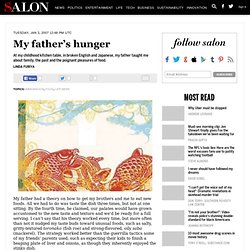
All we had to do was taste the dish three times, but not at one sitting. By the fourth time, he claimed, our palates would have grown accustomed to the new taste and texture and we’d be ready for a full serving. I can’t say that his theory worked every time, but more often than not it nudged my taste buds toward unusual foods, such as salty, gritty-textured toronako (fish roe) and strong-flavored, oily saba (mackerel).
The strategy worked better than the guerrilla tactics some of my friends’ parents used, such as expecting their kids to finish a heaping plate of liver and onions, as though they inherently enjoyed the stinky dish. My Week as a Waiter. 'Julie and Julia': The Servantless American Cook. The Pleasures of Eating - Wendell Berry. Ecoliteracy.org The Pleasures of Eating Many times, after I have finished a lecture on the decline of American farming and rural life, someone in the audience has asked, "What can city people do?
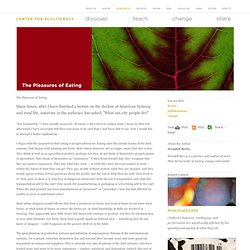
" "Eat responsibly," I have usually answered. Of course, I have tried to explain what I mean by that, but afterwards I have invariably felt there was more to be said than I had been able to say. Now I would like to attempt a better explanation. I begin with the proposition that eating is an agricultural act. Most urban shoppers would tell you that food is produced on farms.
All About Food. Updated: October, 2012 We’ve rounded up the best The Times has to offer about food, including lesson plans and other materials published on The Learning Network, along with related Times articles and multimedia.
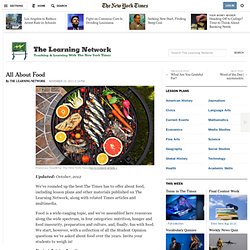
Food is a wide-ranging topic, and we’ve assembled here resources along the wide spectrum, in four categories: nutrition, hunger and food insecurity, preparation and culture, and, finally, fun with food. We start, however, with a collection of all the Student Opinion questions we’ve asked about food over the years. Invite your students to weigh in! Student Opinion Questions All of these questions are still open for comment. What Are the Most Memorable Meals You’ve Ever Had? Food Scraps To Fuel Vertical Farming's Rise In Chicago. Arugula plant beds inside The Plant, a vertical farm operation in Chicago.
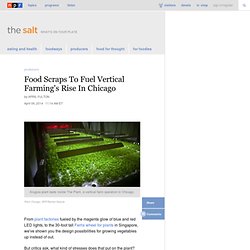
Plant Chicago, NFP/Rachel Swenie hide caption itoggle caption Plant Chicago, NFP/Rachel Swenie Arugula plant beds inside The Plant, a vertical farm operation in Chicago. Will Americans Buy Bug Snacks? Maybe ... If They're Funny And Cute. Packages of edible insects lie on a display table at the Denver County Fair.

Luke Runyon/KUNC hide caption itoggle caption Luke Runyon/KUNC Packages of edible insects lie on a display table at the Denver County Fair. Connection between Food and Memories by Kristen M. Anderson. Cuisine and Culture: A History of Food and People - Linda Civitello. Best Food Writing 2011.